 Family members of West Point district commissioner Miata Flowers flee the slum in Monrovia, Liberia, while being escorted by the Ebola Task Force on Wednesday, August 20. The military began enforcing a quarantine on West Point, a congested slum of 75,000, fearing a spread of the Ebola virus. Health officials say the current Ebola outbreak in West Africa is the deadliest ever.
Family members of West Point district commissioner Miata Flowers flee the slum in Monrovia, Liberia, while being escorted by the Ebola Task Force on Wednesday, August 20. The military began enforcing a quarantine on West Point, a congested slum of 75,000, fearing a spread of the Ebola virus. Health officials say the current Ebola outbreak in West Africa is the deadliest ever.  An Ebola Task Force soldier beats a local resident while enforcing a quarantine on the West Point slum on August 20.
An Ebola Task Force soldier beats a local resident while enforcing a quarantine on the West Point slum on August 20.  Local residents gather around a very sick Saah Exco, 10, in a back alley of the West Point slum on Tuesday, August 19. The boy was one of the patients that was pulled out of a holding center for suspected Ebola patients after the facility was overrun and closed by a mob on August 16. A local clinic then refused to treat Saah, according to residents, because of the danger of infection. Although he was never tested for Ebola, Saah's mother and brother died in the holding center.
Local residents gather around a very sick Saah Exco, 10, in a back alley of the West Point slum on Tuesday, August 19. The boy was one of the patients that was pulled out of a holding center for suspected Ebola patients after the facility was overrun and closed by a mob on August 16. A local clinic then refused to treat Saah, according to residents, because of the danger of infection. Although he was never tested for Ebola, Saah's mother and brother died in the holding center.  A burial team wearing protective clothing retrieves the body of a 60-year-old Ebola victim from his home near Monrovia on Sunday, August 17.
A burial team wearing protective clothing retrieves the body of a 60-year-old Ebola victim from his home near Monrovia on Sunday, August 17.  lija Siafa, 6, stands in the rain with his 10-year-old sister, Josephine, while waiting outside Doctors Without Borders' Ebola treatment center in Monrovia on August 17. The newly built facility will initially have 120 beds, making it the largest-ever facility for Ebola treatment and isolation.
lija Siafa, 6, stands in the rain with his 10-year-old sister, Josephine, while waiting outside Doctors Without Borders' Ebola treatment center in Monrovia on August 17. The newly built facility will initially have 120 beds, making it the largest-ever facility for Ebola treatment and isolation.  Brett Adamson, a staff member from Doctors Without Borders, hands out water to sick Liberians hoping to enter the new Ebola treatment center on August 17.
Brett Adamson, a staff member from Doctors Without Borders, hands out water to sick Liberians hoping to enter the new Ebola treatment center on August 17.  Workers prepare the new Ebola treatment center on August 17.
Workers prepare the new Ebola treatment center on August 17.  A body, reportedly a victim of Ebola, lies on a street corner in Monrovia on Saturday, August 16.
A body, reportedly a victim of Ebola, lies on a street corner in Monrovia on Saturday, August 16.  Liberian police depart after firing shots in the air while trying to protect an Ebola burial team in the West Point slum of Monrovia on August 16. A crowd of several hundred local residents reportedly drove away the burial team and their police escort. The mob then forced open an Ebola isolation ward and took patients out, saying the Ebola epidemic is a hoax.
Liberian police depart after firing shots in the air while trying to protect an Ebola burial team in the West Point slum of Monrovia on August 16. A crowd of several hundred local residents reportedly drove away the burial team and their police escort. The mob then forced open an Ebola isolation ward and took patients out, saying the Ebola epidemic is a hoax.  A crowd enters the grounds of an Ebola isolation center in the West Point slum on August 16. The mob was reportedly shouting, "No Ebola in West Point."
A crowd enters the grounds of an Ebola isolation center in the West Point slum on August 16. The mob was reportedly shouting, "No Ebola in West Point."  A health worker disinfects a corpse after a man died in a classroom being used as an Ebola isolation ward Friday, August 15, in Monrovia.
A health worker disinfects a corpse after a man died in a classroom being used as an Ebola isolation ward Friday, August 15, in Monrovia.  A boy tries to prepare his father before they are taken to an Ebola isolation ward August 15 in Monrovia.
A boy tries to prepare his father before they are taken to an Ebola isolation ward August 15 in Monrovia.  Kenyan health officials take passengers' temperature as they arrive at the Jomo Kenyatta International Airport on Thursday, August 14, in Nairobi, Kenya.
Kenyan health officials take passengers' temperature as they arrive at the Jomo Kenyatta International Airport on Thursday, August 14, in Nairobi, Kenya.  A hearse carries the coffin of Spanish priest Miguel Pajares after he died at a Madrid hospital on Tuesday, August 12. Pajares, 75, contracted Ebola while he was working as a missionary in Liberia.
A hearse carries the coffin of Spanish priest Miguel Pajares after he died at a Madrid hospital on Tuesday, August 12. Pajares, 75, contracted Ebola while he was working as a missionary in Liberia.  A member of the Centers for Disease Control and Prevention leads a training session on Ebola infection control Monday, August 11, in Lagos, Nigeria.
A member of the Centers for Disease Control and Prevention leads a training session on Ebola infection control Monday, August 11, in Lagos, Nigeria.  Health workers in Kenema, Sierra Leone, screen people for the Ebola virus on Saturday, August 9, before they enter the Kenema Government Hospital.
Health workers in Kenema, Sierra Leone, screen people for the Ebola virus on Saturday, August 9, before they enter the Kenema Government Hospital.  A health worker at the Kenema Government Hospital carries equipment used to decontaminate clothing and equipment on August 9.
A health worker at the Kenema Government Hospital carries equipment used to decontaminate clothing and equipment on August 9.  Health care workers wear protective gear at the Kenema Government Hospital on August 9.
Health care workers wear protective gear at the Kenema Government Hospital on August 9.  Paramedics in protective suits move Pajares, the infected Spanish priest, at Carlos III Hospital in Madrid on Thursday, August 7. He died five days later.
Paramedics in protective suits move Pajares, the infected Spanish priest, at Carlos III Hospital in Madrid on Thursday, August 7. He died five days later.  Nurses carry the body of an Ebola victim from a house outside Monrovia on Wednesday, August 6.
Nurses carry the body of an Ebola victim from a house outside Monrovia on Wednesday, August 6.  A Nigerian health official wears protective gear August 6 at Murtala Muhammed International Airport in Lagos.
A Nigerian health official wears protective gear August 6 at Murtala Muhammed International Airport in Lagos. 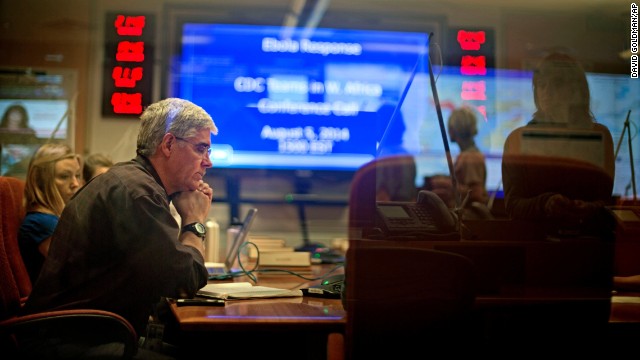 Officials with the Centers for Disease Control and Prevention in Atlanta sit in on a conference call about Ebola with CDC team members deployed in West Africa on Tuesday, August 5.
Officials with the Centers for Disease Control and Prevention in Atlanta sit in on a conference call about Ebola with CDC team members deployed in West Africa on Tuesday, August 5.  Aid worker Nancy Writebol, wearing a protective suit, gets wheeled on a gurney into Emory University Hospital in Atlanta on August 5. A medical plane flew Writebol from Liberia to the United States after she and her colleague Dr. Kent Brantly were infected with the Ebola virus in the West African country.
Aid worker Nancy Writebol, wearing a protective suit, gets wheeled on a gurney into Emory University Hospital in Atlanta on August 5. A medical plane flew Writebol from Liberia to the United States after she and her colleague Dr. Kent Brantly were infected with the Ebola virus in the West African country.  Nigerian health officials are on hand to screen passengers at Murtala Muhammed International Airport on Monday, August 4.
Nigerian health officials are on hand to screen passengers at Murtala Muhammed International Airport on Monday, August 4. 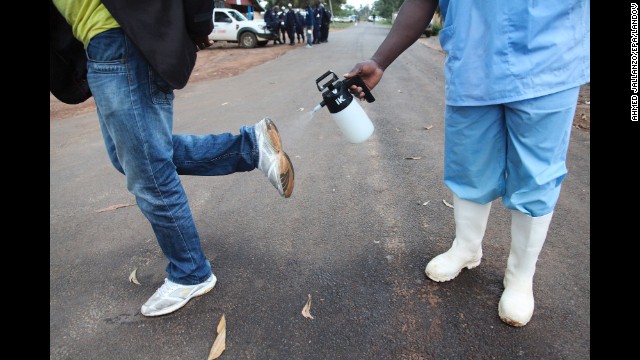 A man gets sprayed with disinfectant Sunday, August 3, in Monrovia.
A man gets sprayed with disinfectant Sunday, August 3, in Monrovia.  Dr. Kent Brantly, right, gets out of an ambulance after arriving at Emory University Hospital in Atlanta on Saturday, August 2. Brantly was infected with the Ebola virus in Africa, but he was brought back to the United States for further treatment.
Dr. Kent Brantly, right, gets out of an ambulance after arriving at Emory University Hospital in Atlanta on Saturday, August 2. Brantly was infected with the Ebola virus in Africa, but he was brought back to the United States for further treatment.  Nurses wearing protective clothing are sprayed with disinfectant Friday, August 1, in Monrovia after they prepared the bodies of Ebola victims for burial.
Nurses wearing protective clothing are sprayed with disinfectant Friday, August 1, in Monrovia after they prepared the bodies of Ebola victims for burial.  A nurse disinfects the waiting area at the ELWA Hospital in Monrovia on Monday, July 28.
A nurse disinfects the waiting area at the ELWA Hospital in Monrovia on Monday, July 28.  Liberian President Ellen Johnson Sirleaf, right, walks past an Ebola awareness poster in downtown Monrovia as Liberia marked the 167th anniversary of its independence Saturday, July 26. The Liberian government dedicated the anniversary to fighting the deadly disease.
Liberian President Ellen Johnson Sirleaf, right, walks past an Ebola awareness poster in downtown Monrovia as Liberia marked the 167th anniversary of its independence Saturday, July 26. The Liberian government dedicated the anniversary to fighting the deadly disease.  In this photo provided by Samaritan's Purse, Dr. Kent Brantly, left, treats an Ebola patient in Monrovia. On July 26, the North Carolina-based group said Brantly tested positive for the disease. Days later, Brantly arrived in Georgia to be treated at an Atlanta hospital, becoming the first Ebola patient to knowingly be treated in the United States.
In this photo provided by Samaritan's Purse, Dr. Kent Brantly, left, treats an Ebola patient in Monrovia. On July 26, the North Carolina-based group said Brantly tested positive for the disease. Days later, Brantly arrived in Georgia to be treated at an Atlanta hospital, becoming the first Ebola patient to knowingly be treated in the United States.  A 10-year-old boy whose mother was killed by the Ebola virus walks with a doctor from the aid organization Samaritan's Purse after being taken out of quarantine Thursday, July 24, in Monrovia.
A 10-year-old boy whose mother was killed by the Ebola virus walks with a doctor from the aid organization Samaritan's Purse after being taken out of quarantine Thursday, July 24, in Monrovia. 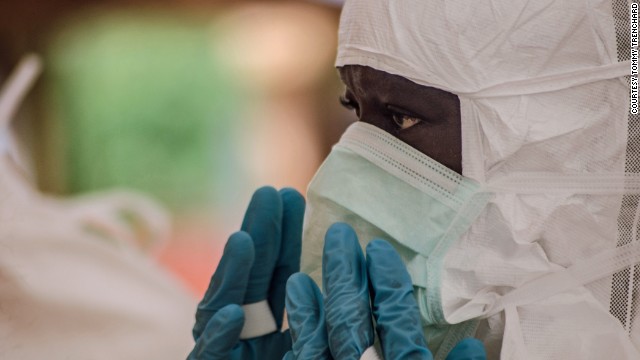 A doctor puts on protective gear at the treatment center in Kailahun, Sierra Leone, on Sunday, July 20.
A doctor puts on protective gear at the treatment center in Kailahun, Sierra Leone, on Sunday, July 20.  Members of Doctors Without Borders adjust tents in the isolation area in Kailahun on July 20.
Members of Doctors Without Borders adjust tents in the isolation area in Kailahun on July 20. 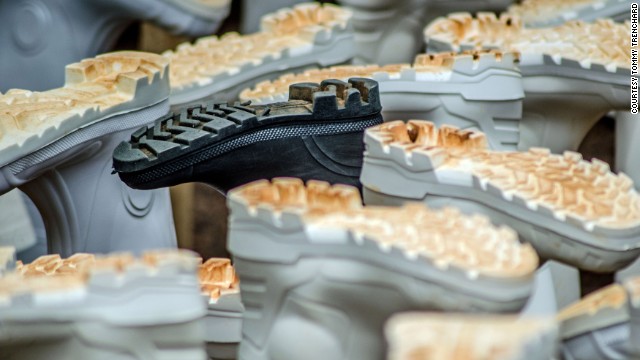 Boots dry in the Ebola treatment center in Kailahun on July 20.
Boots dry in the Ebola treatment center in Kailahun on July 20.  Red Cross volunteers prepare to enter a house where an Ebola victim died in Pendembu, Sierra Leone, on Friday, July 18.
Red Cross volunteers prepare to enter a house where an Ebola victim died in Pendembu, Sierra Leone, on Friday, July 18.  Dr. Jose Rovira of the World Health Organization takes a swab from a suspected Ebola victim in Pendembu on July 18.
Dr. Jose Rovira of the World Health Organization takes a swab from a suspected Ebola victim in Pendembu on July 18.  Red Cross volunteers disinfect each other with chlorine after removing the body of an Ebola victim from a house in Pendembu on July 18.
Red Cross volunteers disinfect each other with chlorine after removing the body of an Ebola victim from a house in Pendembu on July 18.  A dressing assistant prepares a Doctors Without Borders member before entering an isolation ward Thursday, July 17, in Kailahun.
A dressing assistant prepares a Doctors Without Borders member before entering an isolation ward Thursday, July 17, in Kailahun.  A doctor works in the field laboratory at the Ebola treatment center in Kailahun on July 17.
A doctor works in the field laboratory at the Ebola treatment center in Kailahun on July 17.  Doctors Without Borders staff prepare to enter the isolation ward at an Ebola treatment center in Kailahun on July 17.
Doctors Without Borders staff prepare to enter the isolation ward at an Ebola treatment center in Kailahun on July 17.  A health worker with disinfectant spray walks down a street outside the government hospital in Kenema, Sierra Leone, on Thursday, July 10.
A health worker with disinfectant spray walks down a street outside the government hospital in Kenema, Sierra Leone, on Thursday, July 10.  Dr. Mohamed Vandi of the Kenema Government Hospital trains community volunteers who will aim to educate people about Ebola in Sierra Leone.
Dr. Mohamed Vandi of the Kenema Government Hospital trains community volunteers who will aim to educate people about Ebola in Sierra Leone.  Police block a road outside Kenema to stop motorists for a body temperature check on Wednesday, July 9.
Police block a road outside Kenema to stop motorists for a body temperature check on Wednesday, July 9.  A woman has her temperature taken at a screening checkpoint on the road out of Kenema on July 9.
A woman has her temperature taken at a screening checkpoint on the road out of Kenema on July 9.  A member of Doctors Without Borders puts on protective gear at the isolation ward of the Donka Hospital in Conakry, Guinea, on Saturday, June 28.
A member of Doctors Without Borders puts on protective gear at the isolation ward of the Donka Hospital in Conakry, Guinea, on Saturday, June 28.  Airport employees check passengers in Conakry before they leave the country on Thursday, April 10.
Airport employees check passengers in Conakry before they leave the country on Thursday, April 10.  CNN's Dr. Sanjay Gupta, left, works in the World Health Organization's mobile lab in Conakry. Gupta traveled to Guinea in April to report on the deadly virus.
CNN's Dr. Sanjay Gupta, left, works in the World Health Organization's mobile lab in Conakry. Gupta traveled to Guinea in April to report on the deadly virus.  A Guinea-Bissau customs official watches arrivals from Conakry on Tuesday, April 8.
A Guinea-Bissau customs official watches arrivals from Conakry on Tuesday, April 8.  Egidia Almeida, a nurse in Guinea-Bissau, scans a Guinean citizen coming from Conakry on April 8.
Egidia Almeida, a nurse in Guinea-Bissau, scans a Guinean citizen coming from Conakry on April 8.  A scientist separates blood cells from plasma cells to isolate any Ebola RNA and test for the virus Thursday, April 3, at the European Mobile Laboratory in Gueckedou, Guinea.
A scientist separates blood cells from plasma cells to isolate any Ebola RNA and test for the virus Thursday, April 3, at the European Mobile Laboratory in Gueckedou, Guinea.  Members of Doctors Without Borders carry a dead body in Gueckedou on Friday, April 1.
Members of Doctors Without Borders carry a dead body in Gueckedou on Friday, April 1.  Gloves and boots used by medical personnel dry in the sun April 1 outside a center for Ebola victims in Gueckedou.
Gloves and boots used by medical personnel dry in the sun April 1 outside a center for Ebola victims in Gueckedou. 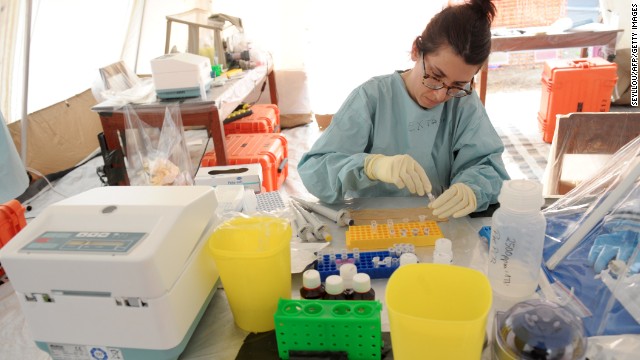 A health specialist works Monday, March 31, in a tent laboratory set up at a Doctors Without Borders facility in southern Guinea.
A health specialist works Monday, March 31, in a tent laboratory set up at a Doctors Without Borders facility in southern Guinea. 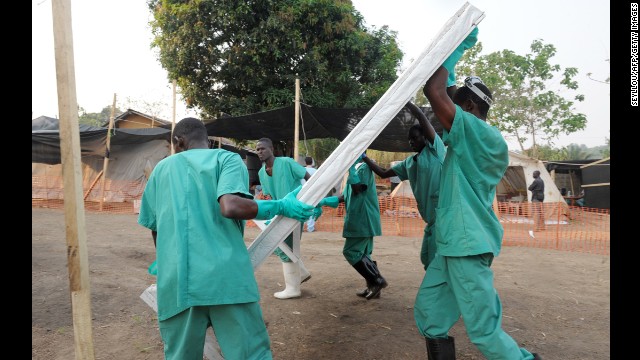 Health specialists work March 31 at an isolation ward for patients at the facility in southern Guinea.
Health specialists work March 31 at an isolation ward for patients at the facility in southern Guinea.  Workers associated with Doctors Without Borders prepare isolation and treatment areas Friday, March 28, in Guinea.
Workers associated with Doctors Without Borders prepare isolation and treatment areas Friday, March 28, in Guinea.
- NEW: Global initiative against outbreak, disease announced in UK
- Epidemiologist says 30,00 people would require experimental drugs, vaccines
- WHO: Number of deaths in Ebola outbreak has reached 1,350
- Right now there is no proven treatment or vaccine for Ebola
(CNN) -- Researchers around the world are being asked to help stop the largest known Ebola outbreak in history.
An emergency research "all call" was issued Thursday by Wellcome Trust and the United Kingdom's Department for International Development amid rising cases of Ebola Hemorrhagic Fever in the west African countries of Guinea, Liberia, Nigeria and Sierra Leone.
Money for Ebola research will be made available from a $10.8 million initiative funded by the trust and the government department. Wellcome Trust is also making an additional five-year commitment for $66.5 million to "develop the next generation of African health researchers," it said in a statement.
This money will go toward sub-Saharan scientists who are studying neglected tropical diseases, HIV, tuberculosis and other diseases, according to a press release.
Experts are being asked to submit their proposals for treatments, details on Ebola and how it spreads, along with strategies on how to prevent its transmission. These proposals will be reviewed immediately, the statement said, so that research can start as soon as possible.
"We are launching an emergency call for research to strengthen what we know about Ebola and how it spreads," International Development Secretary Justine Greening said in a statement. "This will help us better equip those working on the ground so they can tackle the outbreak as effectively as possible and prevent more people contracting this terrible disease."
Wellcome Trust Director Dr Jeremy Farrar says the gravity of the Ebola epidemic demands an "urgent response."
"We believe rapid research into humanitarian interventions and therapeutics can have an impact on treatment and containment during the present outbreak. What we learn could also change the way we approach future outbreaks, providing us with tested tools and techniques that were not available to public health authorities this time," he said.
In an opinion piece published in the journal Nature on Wednesday, Oxford University epidemiologist Oliver Brady said "tens of thousands of doses of experimental drugs are needed to fight" the deadly Ebola outbreak happening in the West African countries of Guinea, Liberia, Nigeria and Sierra Leone.
As of Wednesday, the number of deaths from Ebola had reached 1,350, according to the World Health Organization.
Brady and two of his colleagues pooled available data to estimate how many doses would be required to fight the epidemic, identifying key risk groups that require help and looking at probable levels of exposure. They found "up to 30,000 people so far would have required experimental drugs and vaccines" in the current outbreak.
They concluded that the demand for medicine to treat people with Ebola and prevent further transmission is likely to be higher than most experts realize. Brady warned that both production and distribution must be scaled up to allow for equitable roll-out of any experimental drugs.
Currently there is no approved or scientifically proven drugs to treat Ebola, and no vaccine. Treatment consists of giving fluids, monitoring vital signs and responding to acute medical crisis. Finding that treatment is key in preventing future outbreaks and the spread of the disease, experts say.
Already several experimental drugs are in development. One, ZMapp was given to Americans Nancy Writebol and Dr. Kent Brantly when they were seriously ill. Both seem to be doing well in a hospital in Atlanta. More recently, the drug was given to three health care workers in Liberia who are also recovering.
But researchers say there still isn't enough evidence to say whether the drug will be effective in other patients.
There is continuing pressure on drug companies and researchers to produce a treatment that could work for the masses. The immediate need has put the U.S. Food and Drug Administration drug approval process to the test and challenged them to be more lenient.
The Ebola therapy drug TKM-Ebola has already been tested for safety in small clinical trials, but until now wasn't approved by the FDA for use in patients.
A shipment of 800 to 1,000 doses of the vaccine, known as VSV-EBOV, were delivered to health officials in Liberia, as a donation from the Public Health Agency of Canada last week. It's unclear if anyone in West Africa has received the vaccine.
The Canadian agency said its stockpile is gone. Mapp Biopharmaceuticals,which produces ZMapp, said it has also sent its entire stock of the experimental drug overseas.
Only the facts: Ebola experimental drugs
No comments:
Post a Comment